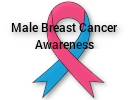5 Signs & Symptoms of Breast Cancer
When Meghan Hall, 34, was diagnosed with breast cancer, it wasn’t because she (or a doctor) felt a lump. She didn’t know the 5 signs and symptoms to check.
“I noticed something green spilled on the front of my shirt. I didn’t think anything of it—until I tried to take it off and realized it was stuck to my nipple,” says Meghan. “My breast was leaking green fluid.”
That’s right: Meghan’s breast cancer symptom was green fluid leaking from her nipples—and her experience isn’t unique. According to preliminary research presented at the UK National Cancer Research Institute’s (NCRI) 2016 conference, one in six women who discovered their cancer themselves caught it based on a less-obvious symptom, like nipple abnormalities and weight loss (a.k.a. not a lump).
These self-reported cancers—especially ones that don’t involve the typical lump—highlight why it’s so important to pay attention to any strange symptoms or changes you may be experiencing, in addition to staying on top of your mammograms and annual checkups, says Neelima Denduluri, M.D., the associate chair of The U.S. Oncology Network Breast Committee.
Instead, it’s best to examine your breasts as a whole. Keep track of what they normally feel and look like. So you can report any changes to your doc, whether they’re cancer or not, she adds. Here’s what to look out for besides lumps:
1 of 5 signs. Dimply, scaly, patchy, or inflamed skin
You know your boobs and their little quirks (like how Leftie fills out your bra so much better than Rightie). So if you notice any changes to their normal appearance, pay attention, says Debra Patt, M.D. Dr. Patt is an ob-gyn and breast cancer expert with Texas Oncology, a practice in The US Oncology Network.
“Any unusual thickening, redness, rash, dimpling, or puckering of your breast skin, or around the nipple, should be checked out by your doctor,” she explains.
2 of 5 signs. Nipple changes
Only mannequins have perfect, pointy, well-behaved nipples; real, human women have to deal with different colors and sizes, positions, textures, and (gasp) hair.
Fortunately all of these things are totally normal and not a problem as long as they’re your normal, says Denduluri. For example, if your nips have always been inverted, that’s just how you’re shaped. But, if they change suddenly, going from pointy to fully or partially inverted, call your doctor stat. Check for any changes in your nipples, including their color and texture, to rule out cancer, she says.
Oh, and BTW, hairy nipples on women have nothing to do with cancer and are totally normal. One in three women have nipple hair, even if they won’t admit it, she adds.
3 of 5 signs. Nipple discharge
Is there anything more alarming than having your breasts start squirting liquid when there’s no baby involved? “It’s normal to have some leakage during pregnancy, while breastfeeding, and up to a year after weaning your baby, but if you notice any discharge any other time have your doctor evaluate it,” says Patt.
Random discharge, especially if it’s red or green or has an odor, can mean you have a problem, including cancer of the breast or the pituitary gland, she explains.
4 of 5 signs. Painful swelling
Swollen and painful breasts are, well, a pain—and while they’re mainly due to hormonal changes (like PMS or pregnancy), they can be linked to breast cancer.
It’s all about the size and placement of the tumor, says Patt, which can be responsible for a change in the size or shape of your breast, or cause of painful swelling. While the vast majority of women who report breast pain do not have cancer, if breast pain and swelling isn’t linked to your menstrual cycle, you’re not breastfeeding, and it appears suddenly or doesn’t go away, give your doctor a call because whatever is happening needs to be addressed, adds Patt.
5 of 5 signs. Changes that aren’t related to your boobs at all
Back pain, neck pain, and unexplained weight loss were all listed as other symptoms that led women to seek medical care and ultimately get diagnosed with breast cancer, according to the NCRI study.
That’s because breast cancer can spread before it’s caught, causing symptoms in body parts that have nothing to do with your boobs. It’s not possible to identify every possible sign of breast cancer (or, rather, that list would be way too long to be meaningful) so when it comes to early detection, you are your own best weapon, says Denduluri. Overall, have your doctor check any persistent, noticeable change.
